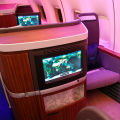4 Travel Hacking Tricks for Domestic Trips
I received a note from a reader who wanted to know about traveling domestically. I admit that most of what I get excited about in the world of travel hacking relates to international travel. I like flying around the planet and changing as many as twelve time zones at once, only to do it again a few days later.
But not everyone feels the same way, and besides—even if you travel far and wide, you still probably need to travel shorter distances from time to time too.
How can you benefit from travel hacking when planning relatively simple trips? Here are four very helpful tricks.
1. Use Skiplagged for hidden-city ticketing.

Hidden-city ticketing is the art of booking a flight to nowhere—a throwaway segment that you don’t use, but you purchase just because it’s cheaper than buying the ticket to the city you’re transiting through. Airlines don’t like it when you do this, but there’s nothing illegal or morally wrong about it.
The challenge is that unless you have a very good understanding of fare pricing, you don’t really know how to search for hidden-city itineraries. Say you’re going to Chicago, and the flight is super pricey—but if you fly via Chicago on a ticket to Madison, Wisconsin, it’s $150 less. How do you know to search for Madison in the first place?
Well, now there’s a site (and an accompanying app!) that will do it for you, and it’s totally free.
Hop over to Skiplagged.com for your next search, and see if you can save. Oh, and when traveling on a hidden-city ticket, be sure you don’t check bags, since you’re not going all the way to your “final destination.”

This site has gone from being something I check once in a while to something I check almost every time I book a domestic ticket. You won’t always save, but often you will—and if not, at least you know you’re not missing out.
2. When booking at short-notice, award tickets are your friend.

Buying plane tickets at the last-minute can be expensive. Airlines are smart, and they know that people who purchase on short notice are in a much different position than people who plan three months in advance. If you buy a ticket to leave tomorrow, chances are it’s not a leisure trip. Therefore, the last-minute airfare market is much more focused on business travelers, who (at least in theory) can pay more than leisure travelers.
But there’s a simple strategy that can very often eliminate not only the price gap, but actually the price altogether: use your miles!
As long as seats aren’t filled, award availability tends to open up A LOT in the days leading up to departure. Most people don’t think to use their miles when time is short, but it’s often the best time to do so.
This is yet another reason why you should be earning points and miles in different programs, even if you don’t have a trip in mind at the moment. Think of it like having a whole set of emergency plane tickets in your pocket.
Lastly, be aware that some airlines charge “close-in” ticketing fees, which is annoying. These can sometimes be waived if you have elite status in that airline. Still, paying $75 + miles for a ticket is better than paying a very expensive walk-up fare.
3. Hack your way to the Southwest Airlines Companion Pass.

Southwest Airlines is loved by many U.S. travelers, and its business model has been copied all over the world. The airline has no real hubs and mostly operates point-to-point flights.
With other airlines, you want to earn elite status so you can get upgraded. With Southwest, there are no upgrades, but if you earn enough points in any given year, you gain the ability to bring a companion of your choice on all your flights for free during the next year (they just pay the taxes). Wow!
Even as a non-Southwest flyer, I admit that this is a pretty nice perk. So how do you earn 110,000 points if you don’t spend your life on airplanes like I do? Simple: you get both the personal and business Southwest Airlines cards. During limited time offer periods, which tend to come around at least twice a year, both cards will get you 50,000 points. To find the link for the Business card, click on “Are you a business owner?” from the application link.
Getting both cards brings you to 100,000 points, just 10,000 points away from that elusive Companion pass. Or actually, you’ll only be 6,000 points away, since the 4,000 points you earned for the $4,000 in minimum spend for the cards ($2,000 each) will also count. Bam!
4. Get at least one hotel elite status.

Hotel elite status gets you free breakfast, upgraded rooms, and late check-out—at minimum. In nicer hotels you may also have lounge access and additional perks.
If you haven’t had status before, you may think you have to spend 100 nights a year at any particular chain to get it. But no! Hotel status is easily hacked. Very often, opportunities pop up where you can earn at least mid-level status merely for signing up. You can then use that status to get “matched” elsewhere, and the match is usually good for at least one year.
Oh, and one tip: it’s usually much easier to maintain a legit hotel elite status than it is to maintain a legit airline status. Airline status can get matched too, but maintaining it over time requires a lot of work. Hotels are easy.
Also, these credit cards also come with built-in elite status just for carrying them.
- IHG Rewards Club
- The Platinum Card® from American Express
- The Hyatt Card
- Marriott Card
- Hilton HHonors™ Card from American Express
Bonus Tip: Drive a rental car across the country.

OK, I’ve never actually done this. But it’s totally possible!
If you’d like to take a one-way road trip with someone else’s car (you’re essentially delivering it for them), take a look at either AutoDriveaway.com (U.S.) or HittheRoad.ca (Canada + U.S.).
These services exist because people often need to move their cars cross-country and aren’t able to do it themselves. They pay a fee and the service arranges logistics and insurance. If you’re approved as a driver, you’re free to roam as soon as you pay a refundable deposit. You don’t have to be from the U.S. to do a U.S. road trip—as long as you have a passport with a valid visa and a drivers license from your home country, you can qualify.
For any given assignment, you’re allowed a certain number of days and what they call “an appropriate amount of miles” to complete the trip. I assume that means you can sightsee a little along the way, but you can’t drive 1,000 miles in the opposite direction of your destination.
After dropping off the car you’ll have to get back to where you started, of course. But that’s why you have miles and points… right?
Even if you don’t want to take showers on airplanes or fly around the world in a week, travel hacking can still help you. Get those points and put them to good use!
###







